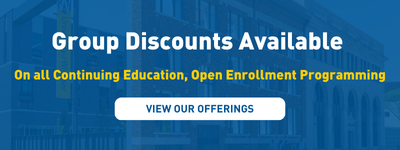Continuing Education at the University of Windsor has a variety of options for customized corporate and skills training. Whether there is a need for internal training on specific topic or skill, or supporting professional growth to build a diverse and innovative workforce, our team will work with you to create the best-fit schedule, pricing and flexibility that suits your organizational needs. Courses can be delivered online, in-person, or in a hybrid format. In addition to courses listed below, new offerings are being developed on an ongoing basis. We have collaborated with diverse organizations spanning both private and public sectors, including industries such as manufacturing, education, municipal governance, healthcare, and not-for-profit sectors.
Contact us at continue@uwindsor.ca to explore training options for you and your organization.
Leadership and Supervision Program
The Leadership and Supervision Program consists of 5 or 6, three-hour courses:
Explore the fundamentals of managing yourself, leading teams and personal leadership effectiveness. Participants will have the opportunity to discover and leverage leadership strengths and find strategies to address gaps to improve performance to lead more effectively. Participants will learn how to communicate authentically, develop a leadership presence, and bring out the best in others.
- Develop effective strategies to communicate vision and business goals to enlist support and action
- Assess your strengths and areas for development as a leader and how to improve leadership ability
- Learn self-management skills required to model adaptive leadership principals and integrate theory to lead adaptively to individual employees
- Develop best practices to successful leadership including the use of influence and inspiration for action
Learn about the psychology of change, at the individual employee and organizational level. Strategies for planning organizational change and managing change will be developed. Further, you will learn how individual employees may react to change, and what tactics can be used to minimize negative consequences for employees, and what tactics may be used to help employees cope with change.
- Understand the psychology of change and its impact on teams
- Create a change plan to guide organizational transition
- Identify tactics to overcome resistance of change from your team
- Develop mental health strategies to encourage personal resilience and coping through change and transition
Learn the essential leadership, coaching, and performance management skills to effectively lead individuals and teams. Participants will build self-awareness about their leadership styles and learn best practices for performance management. This skills-based course will provide participants with an opportunity to amplify coaching skills with a focus on the theory and techniques that support compelling coaching experiences.
- Identify the core functions and responsibilities of a supervisor and how to efficiently complete work with and through other people
- Demonstrate how to appropriately use coaching and influence for problem solving, development and performance
- Develop an honest awareness of yourself and how your behaviour impacts others
- Understand the key elements in performance management and how to ensure maximum performance levels for employees
- Learn how to give constructive feedback in a variety of performance situations to set clear accountability for employees’ performance
- Understand the critical elements in the coach-employee relationship and build coaching relationships with employees
How do great teams function? The Science of Effective Teamwork workshop will bring you through the stages of group development and the drivers of effective teamwork. You will investigate your own personal conflict management style and learn how to effectively manage conflicts in teams. Upon
completion of the workshop you will have a plan to apply the best practices of building a resilient team to your own teams in a work setting.
- Incorporate “all star team” strategies into your teams
- Use resilience building strategies within your team
- Manage conflict effectively to expedite team development
- Identify and define effective communication
- Develop familiarity with key body language elements and how they impact communication
- Explore barriers to effective communication
- Investigate the art of listening and sort out how we interpret the communication we receive
- Recognize the influence of culture and diversity on communication
- Utilize the building blocks of effective and engaging communication
- Reflect on their own personal communication skills and set goals to use the new skills developed in the class in the workplace
Introduction to Project Management
(3 Hours, Online Live Instruction)
Using a toolkit, you will learn about the project management process. You will consider the triple constraint theory, how to avoid common pitfalls, and learn how emotional intelligence can affect communication at work. Participants who successfully complete the Introduction to Project Management module will be prepared to successfully lead a small business project.
- Recognize the project lifecycle and best practices when managing projects in the workplace.
- Develop communication strategies to interact with project team members and stakeholders.
- Recognize the competencies required to manage projects in the workplace.
- Reflect on a current workplace project apply best practices in project management
Receive a Certificate of Completion from the University of Windsor upon completion of all modules.
Fundamentals of Conflict Management Certificate
Addressing workplace conflict begins with effective interpersonal skills and strong relationships. This class will provide you with the tools and practice to help you effectively engage in difficult conversations with your supervisor, peers and clients. Learn strategies to turn conflict into collaboration and build the confidence to share new ideas and influence others towards a goal.
Upon completion of this class you will learn to:
- Build effective working relationships
- Practice engaging in difficult conversations by
- Creating a safe environment for successful conversations
- Walking through the steps for a successful confrontational conversation
- Providing meaningful feedback in various situations (ie. during a performance review or client presentation)
- Use a structured approach to problem solving and managing conflict
This class investigates a Constructive Conflict approach to manage conflict in your workplace. Through the analysis of workplace scenarios, you will examine the source of the conflict, the motivation for the conflict of all parties involved and work toward a building a solution.
Upon completion of this class you will:
- Identify the importance of addressing conflict
- Recognize the causes and sources of conflict (Healthy and Unhealthy)
- Use a constructive conflict model to analyze conflicts in a workplace setting
- Consider conflict in the social-cultural context
Learners who successfully complete both classes will receive a Certificate of Completion in “Fundamentals of Conflict Management”. Each class requires attendance and assignment submissions for successful completion.
Equity, Diversity, and Inclusion Training
The murders of George Floyd and Breonna Taylor in the U.S. as well as the brutal beating of Defonte Miller and death of Regis Korchinski-Paquet in Canada have reinvigorated the Black Lives Matter movement and have sparked new discussions about the prevalence of anti-Black racism (ABR) in Canada. This three-hour online class will help you to build your foundational knowledge on race literacy and consciousness by discussing a glossary of terms related to ABR, unconscious bias and contemporary ABR topics such as Black Lives Matter and the N-Word.
This course offers a critical understanding of workplace equity, diversity, inclusion, and belonging practices. Students will learn about concepts and theories foundational to addressing issues of inequities. Learners will better understand how their own experiences shape their ability to lead across difference and inclusion and how to shift from a place of awareness to action. Our exploration of diverse and inclusive workplaces will be examined through concepts such as bias, prejudice, discrimination, and privilege. This course offers a roadmap and tools for organizations to co-create, equitable and inclusive workplace practices emphasizing the value of diversity and inclusion. The instructor may adapt content to address current issues.
An introductory course on the social, cultural, and historical resurgence of Indigenous knowledge and practices with a particular focus on the Anishinabe of southwestern Ontario. The one-day class will give learners a better sense of Indigenous traditions to prepare the workplace to design and deliver culturally appropriate program of these clients.
Topics will include, but are not limited to: Indigenous history, colonization of Indigenous people, culture and traditions of the Anishinabe, Indigenous knowledge, Truth and Reconciliation and the Indian Residential School Legacy.
Professional Skills Development
This interactive session is about brilliant service – what it is, how to achieve it, and how to leverage its benefits for strategic purposes. Initially, participants will establish a robust understanding and appreciation of service and its importance. Building on this foundational overview of customer service, participants will progress to a strategic application of service. Participants will develop a forward-looking strategic framework designed to enhance organizational performance through service.
- Identify and define great communication
- Define customer service excellence
- Formulate strategies for handling customer objections
- Identify and practice “Steps to Great Customer Service” with mini-case scenarios
A key corporate and professional skill set traditionally found in the financial – administrative area of a company. How a company buys its goods, services, and other requirements contributes to its corporate image and reputation. Procurement in the public sector requires attention to fairness, transparency, competitiveness and compliance with government rules, regulations and national and international trade agreements. In the private sector, attention focuses on best value and operational requirements defined in corporate policies which should reflect their mission and values, e.g. corporate citizenship – fair and trusted buyer/seller.
- Procurement Planning (requirement definition and sourcing strategies, area of competition, market capacity)
- Solicitation type
- Evaluation and contract award
- Contract administration
- Business internal controls (delegated and signing authorities, e.g. spending, contract award, legal form of agreement)
- Payment
Assessment and payment of applicable duties requires an understanding of tariff schedules and proper classification and valuation of goods in trade. Access to preferred tariff treatment under trade agreements like NAFTA depends on knowledge of and compliance with rules of origin. Trade service providers can help manage the technicalities of customs administration. Learn to avoid compliance issues and incorporate the implications of customs costs and regulations into your planning, purchasing and marketing
- Clear definitions and examples of foundational concepts (tariffs, duties, forms, certificates, drawback, audits, and others)
- Explanation of how those concepts are integrated into efficient and compliant customs procedures
- Case examples and step-by-step guides for overcoming customs challenges
Professionals will be provided with an overview of how to create and present a short and informative briefing note. Learners will be expected to bring an issue to the class and begin to create a briefing note that incorporates the concepts discussed in class.
Upon completion of this class, learners will:
- Understand the purpose, structure, and characteristics of a briefing note
- Develop a clear and concise briefing note
- Practice tailoring the content, context and language of the brief so the recommendation is useful to the audience
- Incorporate various types of evidence to create an evidence-informed decision/recommendation
- Compose a communication strategy to build consensus during a presentation through a briefing note
Presenting complex content is challenging, especially when you are presenting to an audience with non-technical knowledge. In this class, participants will learn how to use technology and demonstrate concepts and solutions to simplify information for a specific audience.
Upon completion of the class, participants will be able to:
- Identify strategies for preparing and delivering a successful business presentation
- Select the appropriate technologies for an engaging and persuasive presentation
- Simplify technical concepts for a non-technical audience
- Incorporate Audio-visual aid design principles in presentation slides
- Create tables, charts and SmartArt in PowerPoint
- Handle difficult inquiries in presentations
This online class introduces data analytics to business professionals. Emphasis will be placed on understanding the nature of business data, analyzing this data to obtain business insights, and communicating key insights derived from the application of data analytic techniques.
Organizing and Presenting Data
- Creating Spreadsheets and Charts
- Design a Spreadsheet
- Conditional Formatting
- Tables and Filtering
- Creating Charts
- Logical spreadsheet design
Macros and Visual Basic
- Introduction to macros
- Conceptual introduction to macros: why use them?
- Recording macros
- Introduction to Microsoft Visual Basic for
- Applications (VBA)
- VBA syntax
- Coding macros from scratch
- Recording basic formatting macros
- Recording Advanced Filter, Clear Filter macros
- Writing code for basic formatting macros
- Writing code for Advanced Filter, Clear Filter
- macros: what’s different?
- Input boxes
- Data sorting
- Copying data for one sheet to another
Virtual teams are becoming a necessity to achieving business outcomes. In this interactive session, participants will be guided through the following topics:
- Characteristics of a successful virtual team
- Strategies to overcome challenges virtual teams face
- Team building best practices for productive virtual teams
- Effective meeting management techniques for virtual meetings
- Technology communication tools that support virtual collaboration
Through self-reflection and interactive discussions, participants will learn the best practices for effective communication (face-to-face and virtual) for challenging conversations with difficult people. Learners will identify potential barriers to communication, discuss strategies on overcoming the barriers and practice active listening techniques.
Learners will:
- Recognize the various communication frameworks
- Identify ways communication can fail
- Practice improving listening skills and reacting to concerns
- Identify techniques for effective and engaging communication
- Discuss best practices of communication in a virtual work environment
Succession Planning (6 hours, In Person or Online Live Instruction)
Succession planning is a critical component of organizational stability, sustainability and growth. An effective Succession Plan provides numerous benefits including employee development and retention, knowledge and skill retention for the organization, and increased employee engagement. Through a combination of theory and practical exercise, this course provides organizational leaders with a roadmap and the tools to develop and implement a Succession Planning Program in their workplace.
Key learning objectives:
- Explore common organizational staffing challenges
- Understand how a robust succession plan can resolve these challenges
- Key elements of a successful succession plan Planning
- Preparation
- Implementation
- Maintenance and Support
- Evaluation
- Begin to design your own succession plan that is aligned with organizational strategy and objectives
Healthcare Workshops
This full day workshop is designed for those who have experience in basic Lead II ECG interpretation and wish to learn how to analyze and interpret 12 lead ECGs. It will provide a refresher of arrythmia interpretation and then will focus on the “need to know” subjects of 12 lead electrocardiography. It will include basic electrophysiology, a framework for interpretation, a review of the normal 12 lead ECG, abnormalities and recognition of ECG changes seen in myocardial ischemia and infarction.
Topics include:
- Arrhythmia Interpretation
- Basics of the 12 lead ECG
- Ischemic versus myocardial infarction patterns
- Axis deviation and bundle branch blocks
- Hypertrophy and electrolyte imbalances
Build Your Own Program
Work with our learning developers & instructors to build out a custom training plan, tailored to the needs of your organization. Review the steps below to understand the lifecycle of a custom training program.
Send us a message at continue@uwindsor.ca
Please let us know the following information:
- What is the name of your organization?
- Who is the primary contact looking to set up this training?
- What type of training are you looking for? Please see our pre-built training options as a reference for the different training topics we run.
- How many people are you looking to have trained?
- When would you like this training to take place?
Once we receive your request, a member of our team will reach out to learn more.
A member of our team will schedule a meeting to learn more about your organization and your desired learning outcomes. During this conversation, we’ll discuss your training format preferences, customization needs, budget, and other contractual details.
Once we receive your approval to proceed, our representative will collaborate with a learning developer to begin creating your customized training plan.
Next, we’ll collaborate with our program developers and instructors to create a training plan tailored to your needs.
Once the plan has been finalized, we’ll schedule a follow-up meeting with your team to review the key learning elements and outcomes. You’ll also have the opportunity to speak directly with the instructor, ask questions, and request any final adjustments to the training plan.
In the final step of the build process, we’ll work closely with your team to finalize the training plan and confirm key logistical details—including pricing, training format (in-person, online, or on-site), scheduling, and more.
Once everything is approved, we’ll schedule your training and prepare all necessary learning materials and documentation.
In this final stage, your team will participate in the customized training program. Upon completion, participants may receive Certificates issued by the University of Windsor.
A member of our team may follow up with your organization to request information about your experience training with us.
Testimonials

Click here to learn about our leadership training with Stellantis.









